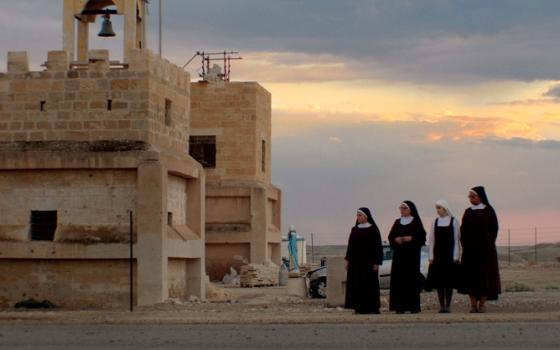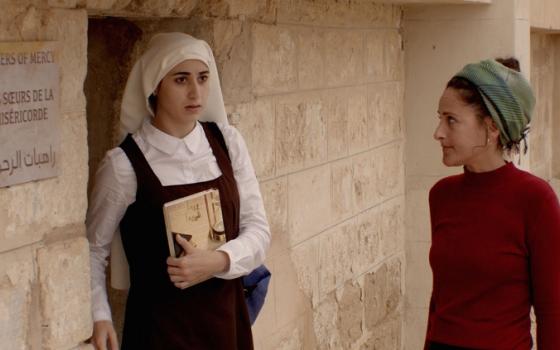"Ave Maria," a 14-minute comedy about an unexpected encounter between a group of nuns living in the Palestinian West Bank and a family of Jewish settlers, is one of five shorts nominated in the Academy Awards category of best live action short film.
The film centers on what happens when two groups who live by the strict demands of their respective religious faiths discover that they have to bend the rules and work together to solve a shared dilemma — in this case, a car breakdown outside the sisters' convent.
The members of the Jewish family, trying dearly to obey the rules of the Sabbath, need the assistance of the sisters to get on the road back home. The sisters have their own set of challenges to help the stranded visitors: They have taken a vow of silence, making communication difficult.
Without giving too much away, I can say that the sisters and the Jewish family find a solution that works. The settlers eventually go on their way, and the sisters resume their contemplative life. The figure of Mary holds a key part of the resolution.
In momentarily dropping what Palestinian-British director Basil Khalil calls "extreme ideals," two groups from different though parallel worlds discover that they "could get along just like anyone else could."
Khalil told Global Sisters Report that people in the Middle East "are born into a religion," and "they don't get to choose it at birth." What they do choose, however, "is the level of extremism or dedication [to the religion], and each comes with its set of extra rules."
What Khalil wanted to highlight in the film is that sometimes, "strict rules can be broken for the common good. . . . It won't be the end of the world when you reach out to help someone in need, even though you might have to break a rule or two."
Though Khalil believes that the Israeli settlers are "living on stolen land," neither group depicted in the film loses their humanity in the unexpected encounter.
"I didn't set out to mock any religion," he said, "but what I did was put two opposite sets of 'rules' into one room and forced them to work together."
Khalil added, "That's where the comedy comes out from, the human reaction, the awkward situation they're in and their realization that they need to break some rules in order for each side to return to their routine."
Personal experience played a part in the film's development.
Khalil, 34, was born and brought up in the city of Nazareth, Jesus' hometown. His family's home was located near a Carmelite convent. The sisters there were known for their vow of silence, and the director recalled that people saw "the outward appearance of the nun's habit, but never really got to know much about [the sisters'] personalities and past lives."
"They weren't born as nuns," he said. "They chose the life of solitude and dedication."
In the film, each of the sisters has a "backstory." The mother superior was once a police officer, while a young novice's father was a mechanic, so "she knew her way around a car," Khalil said.
Religious awareness is part of the director's own background. Khalil's father is an evangelical Protestant minister who still has a church in Nazareth, and his grandmother was Roman Catholic.
"We grew up with the Bible, in the land of the Bible. It was everywhere," Khalil said.
Also in the air when he was growing up were Jewish teachings and understandings about religious faith.
"So I was familiar with all the Christian and Jewish rules and customs from a very young age," he said.
Another motivation for making the film is to raise awareness that some Palestinians are Christian — a fact that outsiders often overlook, Khalil said.
"The information they get on Palestinians is from the agenda-driven news, and they have this idea that all Palestinians are either victims or terrorist sympathizers, depending on which television channel you watch," he said. "However, the fact is they're 99.99 percent normal people with normal issues. The 1 percent are hardline extremists who seem to hijack the agendas and news feeds."
Khalil said reaction to the film, which was shown at last year's Cannes Film Festival, has been uniformly positive, both among Christian and Muslim Arabs and among Jewish audiences both within and outside Israel.
"They all understand the rules of religion and how [the rules] can get in the way of human contact," he said.
Catholic sisters have also reacted positively to the film. In fact, a Carmelite novice from the same church used in the film has become a big fan, posting on the film's Facebook page "and encouraging her other sisters to watch the film," Khalil said.
"It's very heart-warming that they saw the humor."
[Chris Herlinger is GSR's international correspondent. His email address is cherlinger@ncronline.org.]


